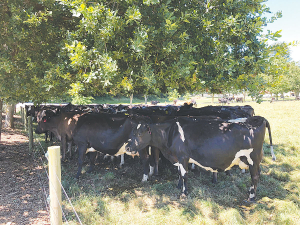With the advent of climate change, dairy farmers could expect to be dealing with more days where their cows are suffering from heat stress.
That’s the message from DairyNZ’s Jacqueline McGowan, an expert in animal behaviour. She says her gut feeling is that the actual heat stress itself will not be worse than the past, the frequency of it will likely be greater.
So farmers will need to be aware of the symptoms of heat stress and have mitigations in place to deal with it more often.
She adds that there are now technologies that can help farmers detect heat stress in their cows at an early stage.
McGowan says, in terms of temperature and humidity, cows are comfortable at between four and twenty degrees Celsius, but above twenty degrees they tend to be looking for some kind of shade or cooling.
“But that depends on humidity and the availability of shade and considering things like wind and cloud cover. You could have quite warm temperatures with no heat stress if there is a lot of wind or you could have the risk of heat stress at lower temperatures if there is blazing sun and no wind,” she told Dairy News.
McGowan says the signs of heat stress tend to develop gradually and one of the first signs is the breathing rate.
She says if the cow starts taking more than seven breaths in ten seconds, that’s an indication that she is starting to feel uncomfortable.
The next sign will be drooling and panting and that needs to be avoided. She says new technology in the form of rumen boluses are good aides for detecting heat stress.
While more research need to be done on the precise impacts of heat stress, McGowan says it does reduce milk production, but just how much is still the unknown.
Migration Options
The options for mitigating heat stress are obvious with providing shade the logical one.
McGowan says this could mean utilising shade in other farm buildings or moving stock to parts of a farm where there are groups of trees. Water sprinklers in the yards and making sure that there is plenty of drinking water in paddocks are other obvious solutions.
In a broader sense, some rearrangement of the farm management system can also help deal with heat stress.
McGowan says one example is changing milking times.
“A lot of farmers are milking once a day through summer or just altering their milking times so that cows are milked early in the morning. Also, getting the cows away from the concrete around the shed before the heat of the day starts up, and maybe moving their milkings later in the day or bringing them a tad earlier in the morning to avoid the heat of the day,” she says.
Another thing that farmers can do to make life more comfortable for their cows is switching around the time of the day they are feeding their cows. McGowan says when you load the cow up with feed, the rumen generates a lot of heat from digestion. So farmers could consider giving the cows more feed at night when it’s cooler to avoid that problem where the heat load from digestion isn’t going on top of the heat from the sun,” she says.
But heat stress isn’t just a cow problem, says McGowan – it’s also a people problem and some of the mitigations suggested for cows will also take the stress off farm staff. She’s heard of people saying that the misters in the dairy shed are more for the people than the cows.


















